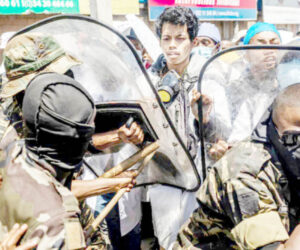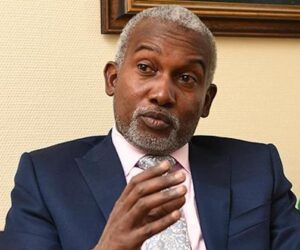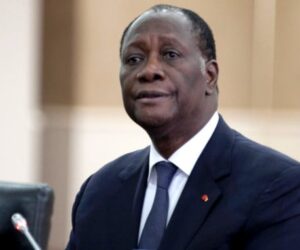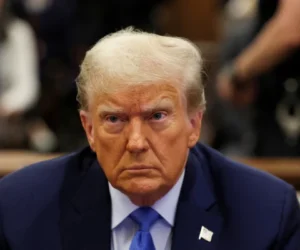The Russian ambassador to Nigeria, H.E. Andrey Podelyshev, has said his country will not accept any settlement in its ongoing war with Ukraine that requires only a temporary ceasefire.
In a recent press conference in Abuja, the envoy who justified Russia’s war against Ukraine said his country is only open to a sustainable and lasting peace.
He pointed out that the root cause of the conflict must be addressed to have a genuine resolution.
SPONSOR AD
“Russia’s approach to a settlement remains unchanged: what is required is not a temporary ceasefire, but a sustainable and lasting peace.
“A genuine resolution is impossible without addressing the root causes of the conflict. First and foremost, threats to Russia’s security must be eliminated, particularly those associated with NATO’s eastward expansion and the attempt to draw Ukraine into the Alliance.
“As early as 2021, President Vladimir Putin proposed to the USA and NATO the legally binding Treaty on security guarantees for all. This included provisions stipulating that Ukraine would not join NATO, thereby reaffirming its non-aligned, non-bloc status.
“Had these proposals been accepted, and had the West with NATO refrained from geopolitical expansion to the East, Russia would not have been compelled to launch the special military operation.”
He stated that Ukraine must reaffirm its neutral, non-aligned, and nuclear-weapon-free status in accordance with the 1990 Declaration on State Sovereignty, assuring that the Russian Federation, in turn, is prepared to provide security guarantees to Ukraine and reaffirm its commitment to the inviolability of the borders of EU and NATO member states.
“When European leaders gathered in Washington on August 18 this year, they spoke about the need to establish security guarantees for Ukraine and for Europe. Yet not once the Russia’s security was mentioned.
“No long-term agreements can be achieved unless Russia’s By Joshua Odeyemi
The Chinese Embassy in Nigeria has commemorated the 80th anniversary of the ‘Victory of the Chinese People’s War of Resistance Against Japanese Aggression and the World Anti-Fascist War’, with a renewed call for peace, unity, and multilateral cooperation.
Speaking at a symposium to mark the anniversary in Abuja, Chinese Ambassador to Nigeria, Mr Yu Dunhai, de-scribed the commemoration as both “a solemn reminder of shared sacrifices and a renewed pledge for peace.”
“This anniversary is not just a reflection on history but a reminder of the values of courage, unity, and perseverance. We are not here to dwell on hatred, but to honour sacrifices and pledge that such tragedies will never happen again,” Yu said.
The envoy recalled the September 18, 1931 incident, which triggered China’s 14-year resistance against Japanese militarism, highlighting the resilience of the Chinese people and the leadership role of the Communist Party of China (CPC).
Yu also paid tribute to Nigerian soldiers who fought alongside Allied forces against Japan in Burma during the war, stressing that China and Africa share a “legacy of sacrifice in the global anti-fascist struggle.”
Reiterating China’s commitment to peaceful development, the Ambassador cited President Xi Jinping’s vision of building “a community with a shared future for mankind,” alongside global initiatives such as the Belt and Road Initi-ative, the Global Development Initiative, the Global Security Initiative, and the Global Civilisation Initiative.
“China will never forget how hard it was to achieve peace. That is why we remain firmly committed to peaceful de-velopment and to building partnerships that reject hegemony and promote win-win cooperation,” he said.
Yu further stressed that Taiwan’s return to China was part of the post-war international order, reaffirming Beijing’s position that reunification is “a historic inevitability.”
On his part, Mr. Charles Onunaiju, Director of the Centre for China Studies (CCS), explained that the resilience forged during the war shaped China’s post-war political framework, citing the “Three Thirds System” as the foundation of its consultative democracy.
He argued that China’s victory not only rebuilt national strength but also entrenched the philosophy of peace re-flected in the Five Principles of Peaceful Coexistence.
Also speaking, Prof. Sheriff Ibrahim, Director of the Centre for Contemporary China-Africa Research and Head of the International Centre at the University of Abuja, described the war’s victory as “a lesson for humanity, a tale of hope, resilience, and patriotism.”
He outlined six key lessons: rejection of colonialism, patriotism, unity of purpose, justified political resistance against tyranny, international cooperation, and the recognition that victory is earned through resilience.
“The Chinese people’s unprecedented resistance against Japanese aggression transformed them into a paragon of patriotism and resilience. The world must learn from this example and pursue peace with unity and justice,” Ibrahim said.
legitimate security interests are taken into account, as well as the rights of Russians and Russian speaking communities in Ukraine,” he said.
The envoy also called for the protection of the human rights of national minorities in Ukraine, lamenting that everything connected with Russia and the Russian-speaking population has been subjected to eradication since 2014.
“Thirdly, international legal recognition must be given to the new territorial realities: the accession of Crimea, Sevastopol, the Donetsk DPR, the Luhansk LPR, as well as the Zaporozhye and Lugansk regions to Russia.
“Their integration into Russia was based on the free expression of will and the universally recognised right of peoples to self-determination,” the envoy added.








